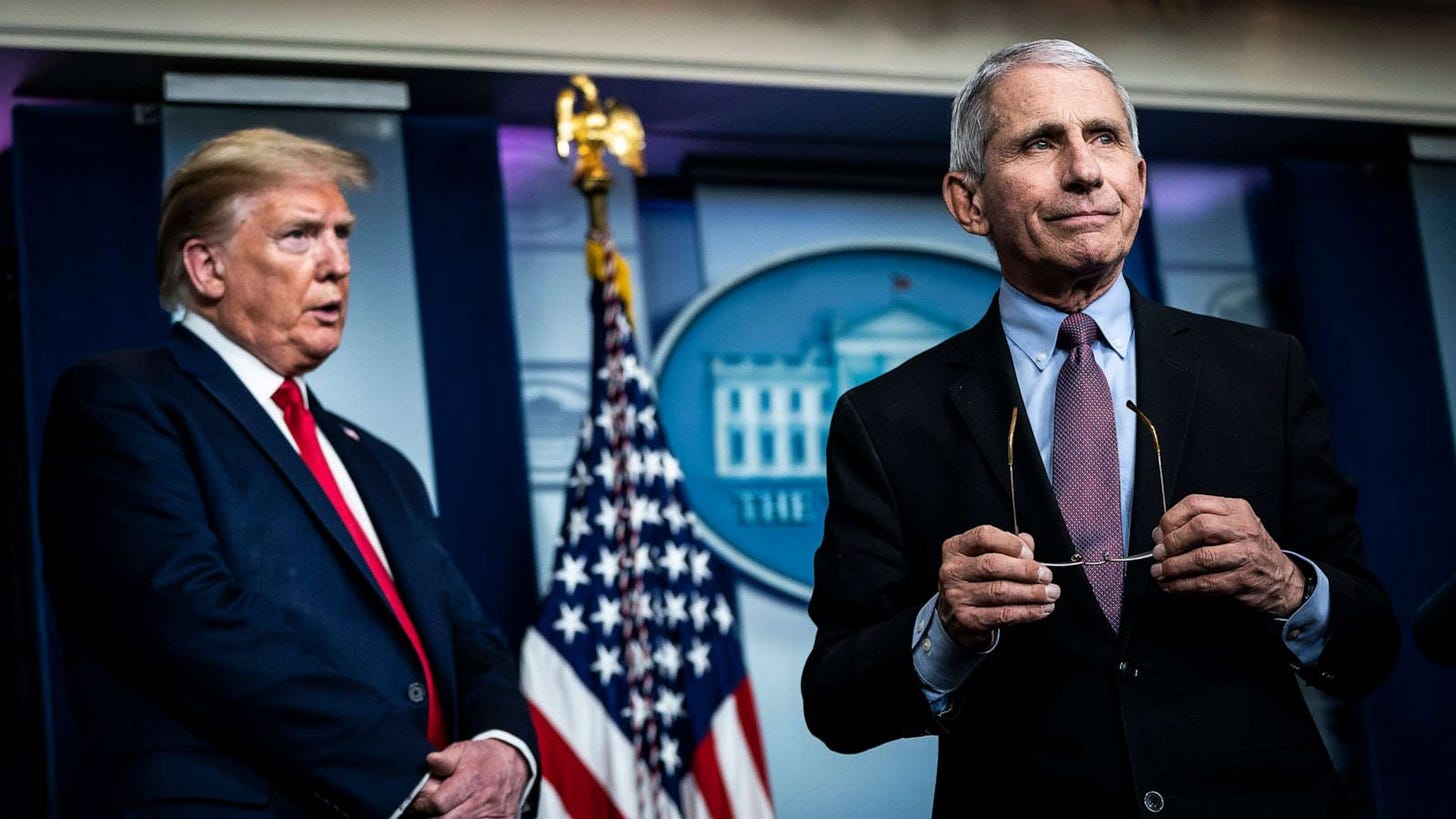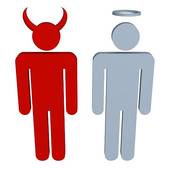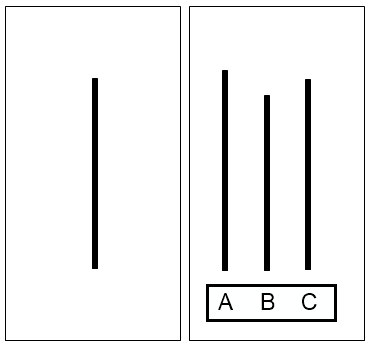“If you’re playing a poker game and you look around the table and can’t tell who the sucker is, it’s you.” --Paul Newman
In 1951, Solomon Asch conducted a landmark experiment in which students were asked to match the segment on a card with one of the same length on another card, a total of 18 times. The task is simple enough (the line segments were of clearly distinct length) that the miss rate was less than 1% under ordinary conditions. However, when the test subject was the last to act following seven actors who sometimes unanimously selected the wrong choice (A, B, or C), the test subject went along with that wrong choice around 37% of the time.
In interview responses following the experiment, the conformity to false results seemed to stem from different sources for different subjects. Some reported actually believing in the false result while others knew they were just going along with the unanimous majority for one reason or another, whether to attain social group status or dodge social group rejection.
In variations on the Asch experiment, a number of interesting observations were made:
The greater the number of people present, the higher the conformity rate.
The more difficult the task, the higher the conformity rate.
The higher the social status of the actors, the higher the conformity rate.
When just one of the seven actors was replaced by another independent subject (a “confidant”), then the group adherence rate dropped to 5%, an 86% reduction in the conformity effect.
When people were allowed to respond privately, conformity rates lowered.
It is not hard to imagine further variations on the experiment. We might even brainstorm variations that result in the greatest conformity effects.
Would it make a difference if all the actors were attractive or all unattractive to the subject?
What if some of the actors wore lab coats? This might be similar to social status, but also relate to the difficulty of the task.
What would happen with you if one of the actors were a close friend? Your spouse? Your boss? Your chief??
During the 1990s, British anthropologist and evolutionary psychologist Robin Dunbar examined the economics of social relationships by studying not just groups of humans, but also other primates. He noticed a seemingly strict monotonicity between the increasing sizes of primate brains and the sizes of their social group. Small monkeys with smaller brains live in groups of size 8 to 12, but larger monkeys with larger brains bandy about in missions of 15 or 20. Larger and larger primates live in larger and larger troops. Baboons tend toward troops of size 50 (varying widely), but humans, with the largest primate brains of all, seemed to live in tribal groups of perhaps 150 to 300 prior to gathering into larger civilizations. The so-called “Dunbar number” was proposed as 150 and its importance to theorists and engineers still seems to be growing rapidly.
I against my brother. I and my brother against my cousin.
I, my brother, and my cousin against the world. (Arab proverb)
Humans do not have the time for seven billion social relationships, much less the physical brain space for limitless useful information capacity. We have finite storage capacity for personal relationships, so our social capacity tends toward an economically optimized limit.
We now go deeper with our own theory on the topic---that we have “Dunbar slots” that are specific to family, friends, and even...chief. These slots represent irreplaceable relationships in our brains [even if we manage to somehow replace the people we fit into them]. There can be no trust like family trust. There can be no authority guiding the tribe’s survival like that of the chief.
Under this framework, the chief is whomever we think of as the community leader. Ask yourself for a moment whom you picture when you imagine your “leader”. Is it a family member, the mayor of your town, your governor, or somebody else? Is it somebody you know or somebody you don’t know? Who has it been in 2020 and 2021? Former POTUS Donald Trump? Current POTUS Joe Biden? NAIAD Director Dr. Anthony Fauci? Communicative diseases expert Dr. Didier Raoult?
Might we even have a slot for the chief of a rival leader whose success represents an existential threat to our tribe? Is that the effect of calling somebody “the devil”? Is “Never Trump” a slogan designed to enforce a societal tribal split among those whose emotional and mental landscapes are hacked to insert ‘Donald Trump’ into exactly one of two social slots?
Mass media likely hacked most people’s brains to deeper and deeper degrees over the years. The daily inundation of images of political leaders makes it likely that a large swath of Americans think of Donald Trump, Barack Obama, or some celebrity as their tribal chief. And this is how partisanship works as an emotional wedge. If you’re not going along with your chief, you assume you’re a minority or even an outcast among your own tribe. That’s how polarity happens.
The result of hearing your chief say that the line on the left is the same in length as A while hearing the other chief of the rival tribe say that the line on the left is the same in length as C could eventually reach something Asch saw in the responses of many of the participants who conformed. He called it “distortion of perception”. After the daily repetition of tribal pronouncements, the differences between the lengths of the lines (or the results of studies) really do begin to blur so that all that remains is the gut-wrenching courage to make an independent judgment askew from one’s tribe.
Perhaps this is the reason for the calm before the storm. Perhaps the reason why no major media outlet mentioned HCQ a single time prior to March 19, not even to report on Boulware’s experiment announced March 17, and despite the information coming out of China, South Korea, and France suggesting positive results, was to make sure that most people heard Trump speak about it first. That stands out as excellent experimental design if your goal is to bias the largely Never Trump scientists and academics to whose authority you plan to appeal to later.
Immediately following HCQ’s Trump moment, the media went on an all out blitz to associate the topic of HCQ with a sense of fear. Fear of Trump, fear of death, fear of incompetence, fear of opposing scientific authorities, fear of using medicine needed by somebody else, and fear of the unknown. And the campaign of fear didn’t stop there.
Aversion therapy is a form of psychological treatment that involves conditioning a subject to associate discomfort or pain with something that they would then tend to avoid. This may involve the use of drugs that promote aversive mind states. It might also involve pairing uncomfortable stimuli, such as bad smells, with bad habits, such as fingernail biting. In extreme cases, patients have been subjected to electrical shocks to create an association with thoughts or actions. Such is the subject of Anthony Burgess’s novel, A Clockwork Orange.
Such forms of behavioral therapy have been debated for decades, both on the level of efficacy and also on the level of ethics, for those who share such concerns. But the effect need not be perfect or complete. The original arrangement of actors in the Asch conformity experiment works well enough on many. Many participants in Asch’s experiment gave mixed responses, sometimes conforming and sometimes acting independently. Adding to the design the element of tribal fear is enough to generate the nudge needed to recruit more and more anti-HCQ partisans into the mix, which nudges the next wave, generating a cascade powerful enough that many doctors and researchers happy to prescribe HCQ as outpatient treatment in April could firmly reject the HCQ Hypothesis, contra to an avalanche of emerging evidence.









Honestly, this is the only explanation for the irrational times in which we live. I was a good liberal who fought the "Republican" neo-con and Wall St. war criminals of the W. Bush years. The State Dept Cables and other Wikileaks drops opened my eyes to the fact that The Kerry/Clinton/Obama and Democratic establishment were also aligned with these dark centers of power. If the DNC's outright destruction of the Sanders campaign in 2016, along with the ridiculous 2 year Russia collusion circus didn't open the eyes of the "Left" I don't know what will. Though I don't philosophically agree with much of the "Right," I feel that they are much more attuned to the dangers of authoritarianism, censorship, and mandates at this time in American history. They missed their turn to stand up to their own leaders regarding the Patriot Act, financial malfeasance, and imperialist wars. Now the Left is missing their chance to stop the madness that surrounds everything COVID.
Not all humans are as gregarious as chimps and gorillas though. Some of us are more like the Orangutans, living a more solitary life, especially once the kids are grown. I think that makes us less prone to groupthink.